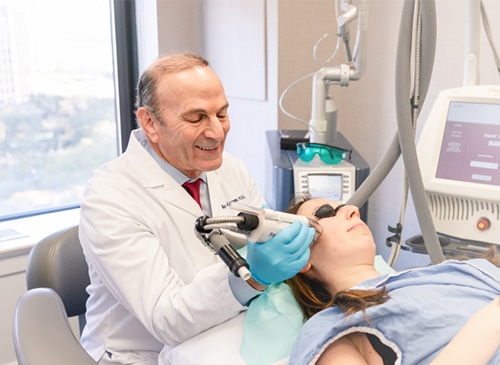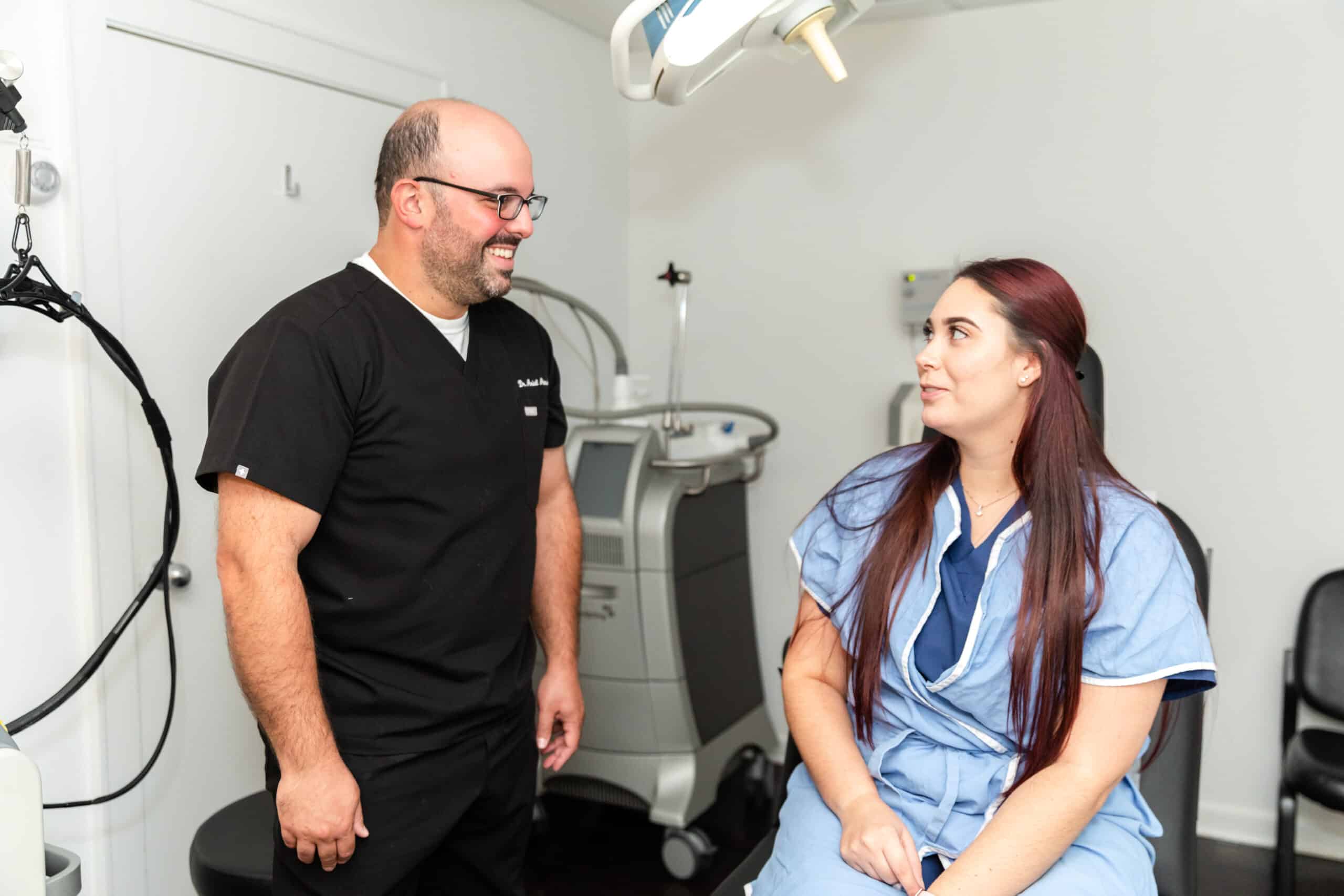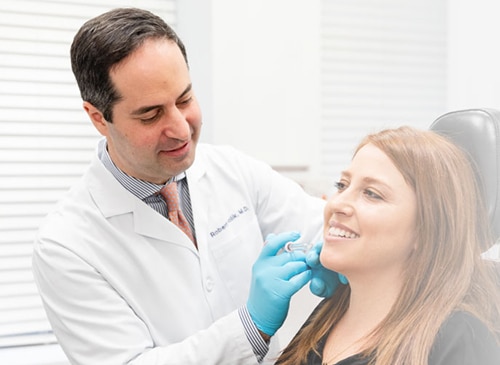Homepage // Treatments / Laser Scar Treatment
Laser Scar Treatment
in New York
Laser therapy for scars has improved significantly over the past several years thanks to the constant advancement of laser technology. While scarring cannot be “cured,” most patients experience substantial improvement with laser treatments.
- Downtime: Minimal
- Pain Level: Minimal
- Results Duration: Long-Lasting
Treats:
Scars from injury, surgery or trauma
Side Effects:
Mild redness and swelling following treatment – skin wounding is also possible
Location:
Anywhere on the face and body
Follow Up:
Some patients will require a series of treatment sessions to achieve an optimal outcome
How Performed:
Lasers target the scar without damaging surrounding skin and tissue
Preparation:
Some patients do not need any anesthetic, while others might have topical or local anesthesia, as well as nitrous oxide or IV sedation
Procedure Type:
Laser
Expected Outcome:
Reduction or elimination of scarring
Onset:
Results are apparent after final treatment session
Laser Scar Treatment
Laser & Skin Surgery Center of New York is a renowned dermatology and plastic surgery center with board-certified dermatologists who customize each laser treatment according to a patient’s needs and goals, helping them gain confidence in their appearance.
How can laser scar treatment help me?
Lasers can treat the following types of scars:
- Hyperpigmented (dark) scars
- Atrophic (pitted)
- Hypertrophic (raised) scars
- Keloids
- Red/pink scars
- Acne scars
- Scars from trauma, burns, or other causes
- Stretch marks
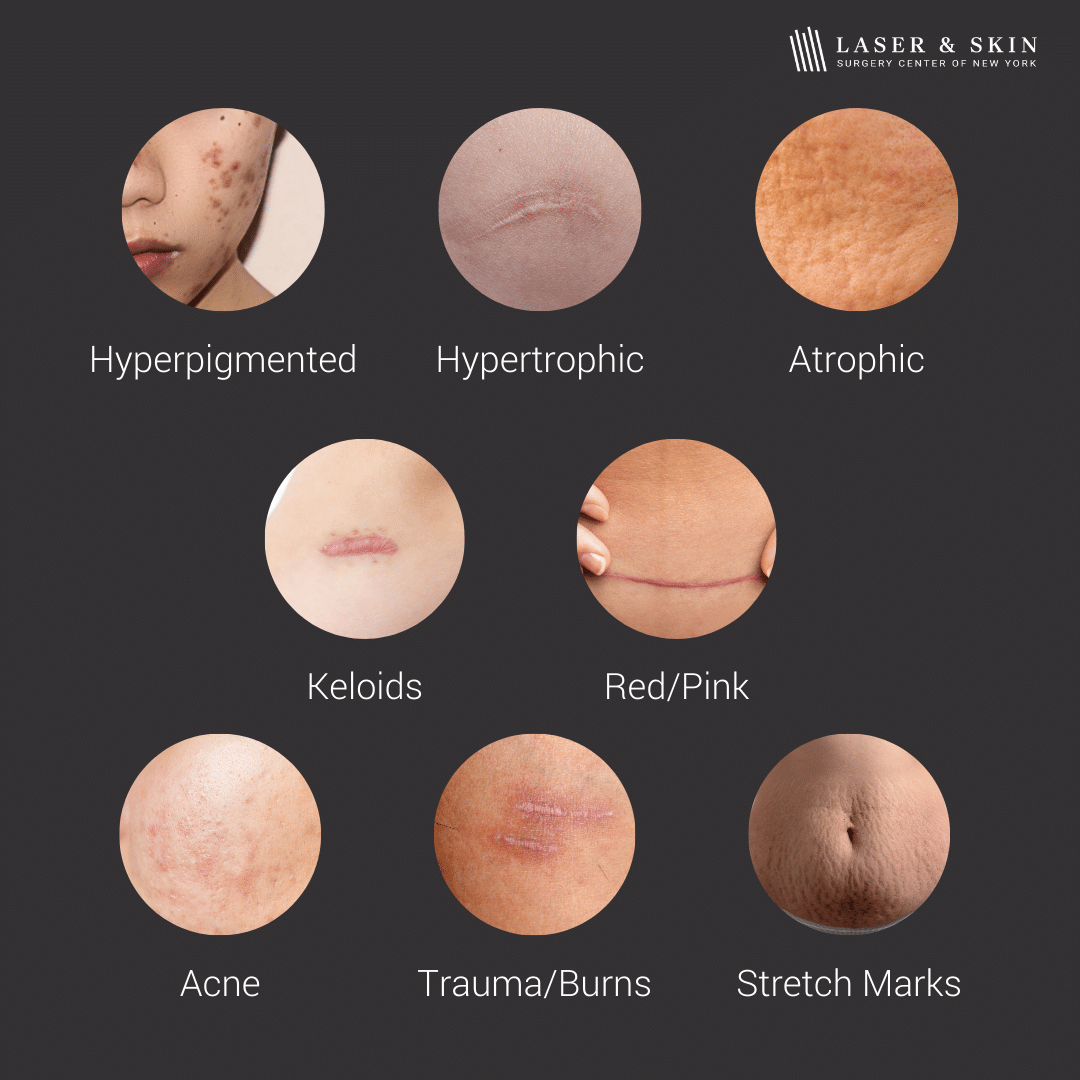
Laser scar treatments offered
Laser & Skin Surgery Center of New Yor offers several effective scar laser treatments, including:
- Vbeam Perfecta: This pulsed-dye laser treats early post-surgical scars, acne scars, and red stretch marks. The device targets blood vessels within scar tissue to reduce redness associated with scars, rejuvenating the skin and restoring a smoother texture with an even skin tone.
- Excel V: This laser targets the pigmented cells in the scar, causing them to break down and lighten the appearance of scars. In addition to diffusing redness in acne scars, it stimulates collagen production to help improve the texture and tone of the skin.
- Fraxel Dual: This fractional laser uses two different wavelengths (1550 and 1927) — one for superficial scarring and pigmentation, the other for deeper scars and wrinkles. The device causes microscopic injuries to the skin, which responds by producing new healthy cells to replace the old and damaged tissues. As a result, the skin becomes smoother and improves the appearance of scars.
- Fraxel Re:pair: This ablative fractional laser removes the skin’s outer layer and heats the underlying skin cells to promote new collagen and elastin production. It creates softer, smoother, and plumper skin, effectively reducing the appearance of scars. Fraxel Re:pair is more aggressive than the Dual but creates more significant results in as little as one to two sessions.
- PicoSure: This laser delivers short energy bursts to treat acne scarring, skin texture, and pigmentation. It breaks apart scar tissue that the body reabsorbs naturally. As the skin heals and produces new collagen and elastin, the skin becomes smoother.
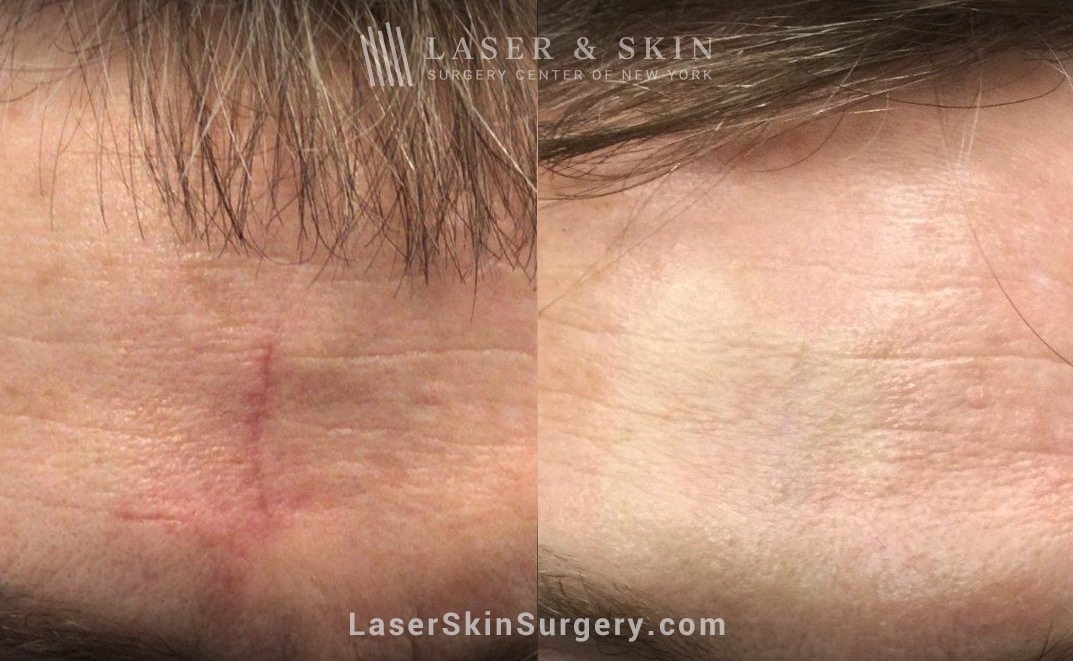
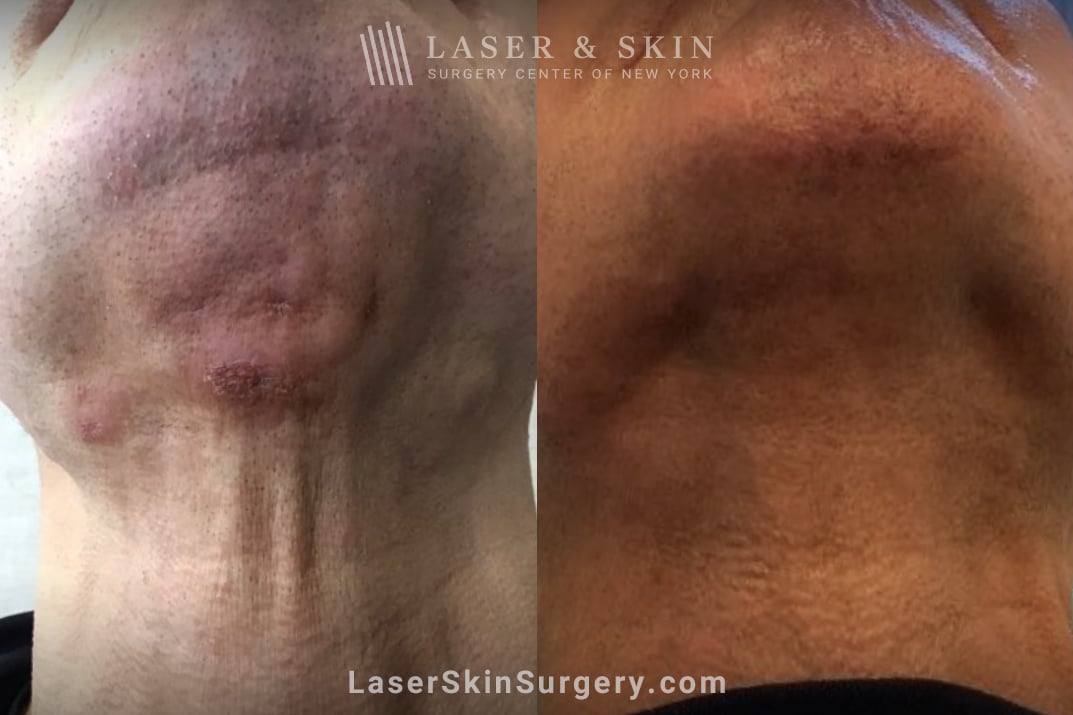
- Ruby: This laser improves the appearance of pigmented scars by shattering pigment into tiny particles that the body flushes out naturally. It targets pigmented lesions and scars while leaving surrounding skin and tissue intact.
- nd:YAG: This Q-switched laser provides an effective hypertrophic scar laser treatment that features multiple wavelength options and delivers rapid pulses to break apart pigment and other skin impurities without damaging surrounding tissue. As a result, the laser rejuvenates the skin, and acne scarring improves with minimal side effects and downtime.
- Active FX and Deep FX: Active FX causes the skin’s upper layer to slough off and reveal healthier skin below, while Deep FX causes deep heating to promote collagen tightening. The skin resurfacing and collagen renewal that these lasers produce result in healthier skin and an improvement in the appearance of scars.
- Erbium YAG: This laser targets the water within your skin cells, vaporizing them to remove micro-layers of skin. This process triggers the body to produce more collagen, resulting in a more youthful complexion and visible improvement in scarring.
- LaseMD: This type of fractional laser treats skin on a cellular level, creating microchannels in the skin to trigger collagen production underneath the scars. The process removes dark, pigmented cells underneath the skin to reveal clearer skin after the treatment.
- PicoPlus: This laser emits short pulses of light to penetrate the skin and reach targeted tissue. It promotes smoother skin and minimizes the appearance of scars.
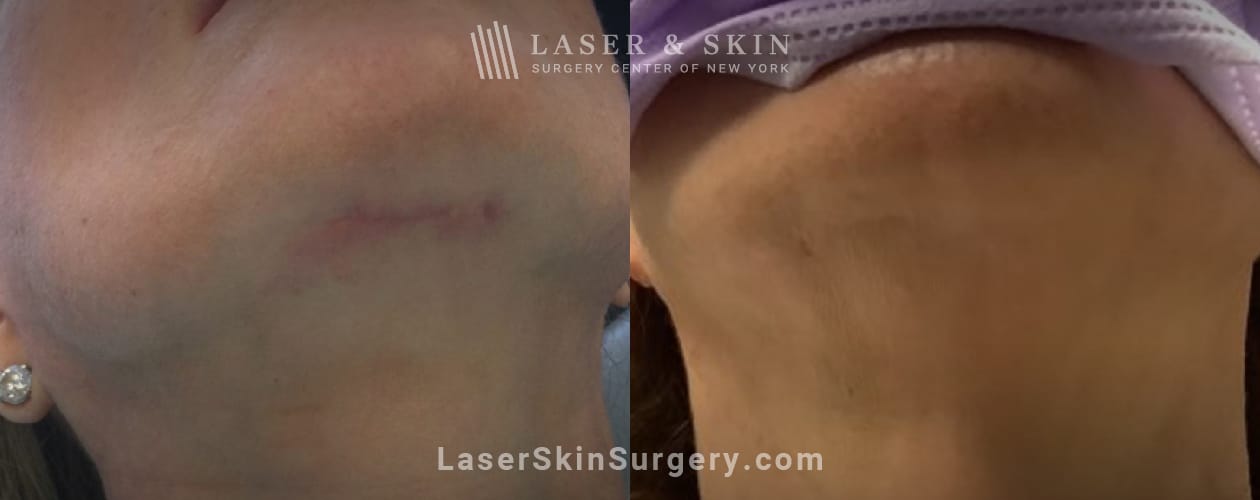
Laser Scar Treatment Alternatives
- Surgical Scar Excision: Surgery may be necessary for large, severe scars or if the scars are causing pain or immobility. Scar excision is one type of surgery that removes the scar formation with an incision and then closes it with stitches. The surgery makes the scar as smooth as possible.
- Ellacor: This micro-coring device uses hollow needles to remove cores of skin to stimulate the body’s natural healing response and produce smoother and clearer skin. Skin renewal improves skin texture and reduces the appearance of scars.
- Genius: This advanced microneedling system rejuvenates the skin through collagen renewal within the skin’s deeper layers. The ultra-fine needles emit radiofrequency (RF) energy to create controlled tissue damage, which stimulates skin regeneration, improving the appearance of scars and creating smoother skin overall.
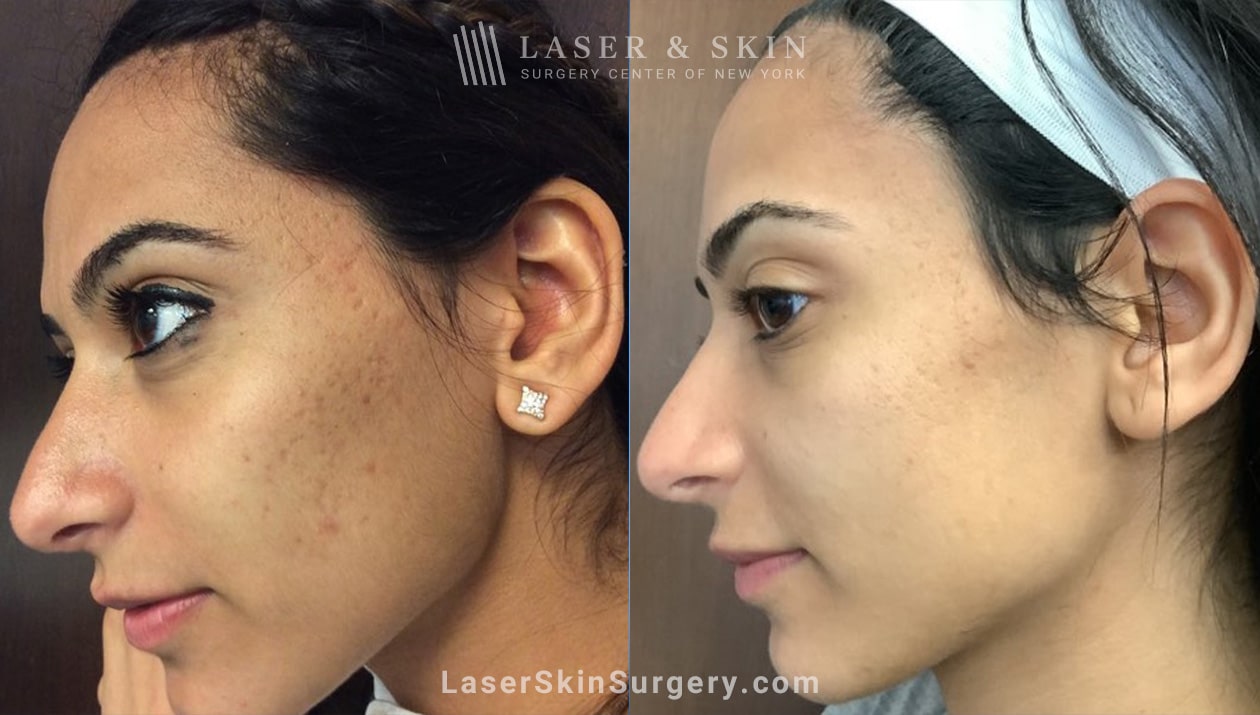
Laser Scar Treatment Before and Afters
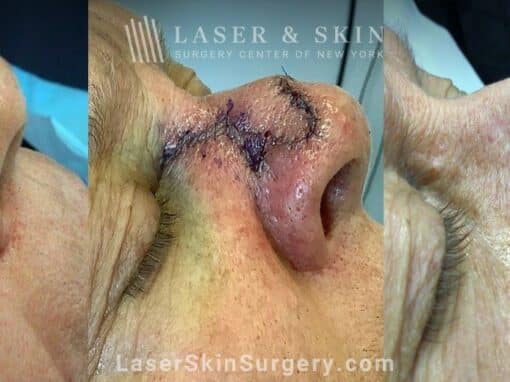
Fraxel restore treatments after Mohs surgery to remove skin cancer from the nose
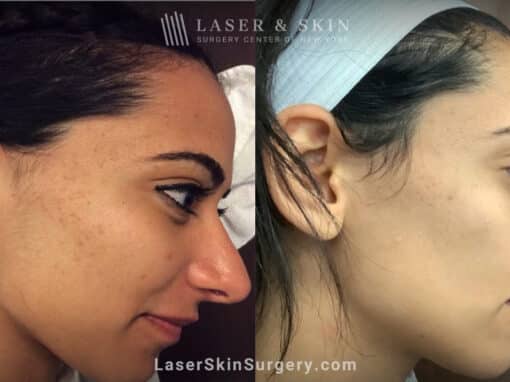
Genius microneedling treatments to rejuvenate skin with acne scars
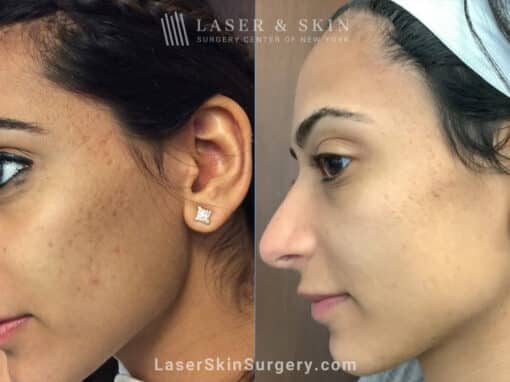
Genius microneedling treatments to rejuvenate skin with acne scars
Laser scar treatment at Laser & Skin Surgery Center of New York
Step 1: Pain Management
Topical numbing cream is applied to the scar and skin to ensure a more comfortable treatment experience. More sensitive patients may discuss other options, such as local anesthesia, with their doctor. In many cases, no anesthesia is required.
Step 2: Laser Treatment
Once the treatment area is numb, your doctor moves the handpiece back and forth over your scar. You may feel a mild snapping (like a rubber band) or tingling sensation. The procedure time varies based on factors, such as the type of laser used, the specific scar treated, and your skin type. On average, treatments take 40 minutes or less.
Step 3: Recovery and Results
You may start to see improvement in your scar in the days following your laser procedure. Typically, most patients will require more than one treatment session to achieve the best results. Most patients see optimal results within weeks of their final treatment.
Schedule laser scar treatment in New York
At Laser & Skin Surgery Center of New York, our team of highly acclaimed board-certified physicians will work closely with you to create a customized treatment plan, so you can achieve your aesthetic goals. Contact us to schedule a consultation and learn more about how we can treat your scars and improve your overall appearance.
Publications
“Treatment of Atrophic Facial Acne Scars With Microneedling Followed by Polymethylmethacrylate-Collagen Gel Dermal Filler.” Dermatologic Surgery, 2019 Dec.
“The Role of Elastic Fibers in Scar Formation and Treatment” Dermatol Surg. 2017 Jan.
“Safety and Efficacy Evaluation of Pulsed Dye Laser Treatment, CO<sub>2</sub> Ablative Fractional Resurfacing, and Combined Treatment for Surgical Scar Clearance.” Journal of Drugs in Dermatology, 2016 Nov. 1.
“Acne scarring: A review of available therapeutic lasers.” Lasers in Surgery and Medicine, 2016 Feb.
“Acne scarring: A review of available therapeutic lasers.Lasers Surg Med” 2015 Sep 28.
“Use of a picosecond pulse duration laser with specialized optic for treatment of facial acne scarring.” JAMA Dermatology, 2015 March.
“Use of a Picosecond Pulse Duration Laser With Specialized Optic for Treatment of Facial Acne Scarring.” JAMA Dermatol. 2014 November 19.
“Successful Treatment of Atrophic Scarring with CO2 Ablative Fractional Resurfacing: Quantitative Volumetric Scar Improvement.” Arch Derm. 2010 February.
“Successful Treatment of Acneiform Scarring with CO2 Ablative Fractional Resurfacing.” Lasers in Surgery and Medicine, 2008 August.
“Ablative Fractional Resurfacing of Acne Scars.” Lasers Surg. Med. 2008.
“Fractional Photothermoloysis for Treatment of Surgical Scars: A Case Report.” J Cosmet Laser Therapy, 2006 April.
“Treatment of Atropic Facial Acne Scars with the 1064nm Q-switched Nd:YAG Laser.” Arch Dermatol. 2004 Nov.
“The Safety and Efficacy of the 308nm Excimer Laser for Pigment Correction of Hypopigmented Scars and Straie Alba.” Arch Dermatol. 2004 Aug.
“Scar Resurfacing with High-Energy, Short-pulsed and Flashscanning Carbon Dioxide Lasers.” Dermatol Surg. 1998 Jan.
scar treatment In The News
Laser Scar treatment
Questions and Answers
Q: What is laser scar treatment and how does it work to minimize scars?
A: Laser scar treatments are not designed to make a scar completely disappear. Instead, they help make a scar appear less noticeable.
The high-energy light from ablative lasers effectively removes the skin’s outer layers and stimulates collagen renewal in the inner layers. As the top layer of the scar peels off and the skin heals, the skin will appear smoother, and the scar becomes less noticeable.
Non-ablative lasers work by heating the dermis to trigger the production of collagen and elastin, which, based on studies, is necessary for scar treatment. In addition to encouraging new and healthy skin cells to grow and replace the damaged cells, some of these lasers also target blood vessels in the scar tissue to reduce redness.
Pulsed light and radiofrequency devices also treat scars through collagen renewal, helping scars appear less noticeable without damaging the outer skin layer.
Q: Is laser scar treatment suitable for all types of scars?
A: Yes. While scar treatments depend on the type of scar you have, your dermatologist will most likely include laser therapy in your treatment plan. These devices can treat a wide variety of scars effectively without relying on invasive techniques.
The best way to determine if lasers can treat your specific scar is to consult with a board-certified dermatologist.
Q: What are the potential side effects or risks associated with laser scar treatment?
A: As with any laser treatment, there are possible risks and side effects, which are minimized in the hands of a qualified dermatologist. These side effects and risks include:
- Pain
- Swelling
- Discoloration
- Bleeding
- Infection
- Crusting
Q: How should I prepare for my laser scar treatment session?
A: To prepare for your laser scar treatment session, you must:
- Avoid chemical peels, sunbathing, tanning beds, and waxing for two weeks before the procedure.
- Avoid perfumes, deodorants, or any potential skin irritants in the treatment area before and after treatment.
- Avoid aspirin, anti-inflammatory drugs, and herbal supplements due to the increased risk of bleeding.
Q: How long do the results of laser scar treatment last?
A: Since laser scar treatments permanently alter the scar, the results are long-lasting. A scar should not return once it has been successfully treated.
Q: Can I combine laser scar treatment with other skincare treatments or procedures?
A: Yes. Your dermatologist may recommend a combination of treatments (e.g., lasers with dermal fillers or lasers with radiogrequency/microneedling) to achieve optimal results.
Q: What is the post-treatment care routine?
A: Your doctor will provide aftercare instructions immediately following your laser treatment. These instructions may include:
- Avoid direct sun exposure for four to six weeks after the procedure.
- Apply a cold pack to the treated area to reduce swelling.
- Take over-the-counter pain medication when needed.
- Wash and apply a good moisturizer daily for the duration of the treatments.
- For facial procedures, you may need to avoid makeup for a few days or until the skin no longer stings or appears red.
Next, read about…
Scar Treatments
Scars are often unwanted reminders of medical conditions, injuries, trauma, or surgery. When they are noticeable, they can also lead to significant embarrassment and self-esteem. Fortunately, there are ways to treat scars today that do not involve incisions, anesthesia, and downtime.
Body Contouring
Body contouring addresses stubborn fat, skin laxity, or cellulite. Our board-certified physicians have been involved in clinical trials to develop new technology that provides superior treatment options. We offer treatments for cellulite, skin tightening, and fat reduction.
Fillers
Laser & Skin Surgery Center of New York’s filler treatments are always performed by board-certified physicians who have extensive experience with injectables. When you come to us for cosmetic care, you can be confident that you can safely achieve a perfectly natural look.
Haven't found
WHAT you are looking for?
patient approved
Trusted Worldwide
patient approved
Trusted Worldwide
laser & skin surgery
center of new york
Contact us
Manhattan:
317 East 34th Street New York, NY 10016
Monday – Friday: 8:00am – 5:00pm
Saturday & Sunday: September through June by appointment only
Same-Day Appointments Now Available
Southampton:
325 Meeting House Lane, Bldg. 1, Ste. C Southampton, NY 11968
Monday - Wednesday, Friday: 9am - 4:30pm
Thursday: 9am - 5pm
Saturday October 1, 2022: By Appointment Only
Same-Day Appointments Now Available
Pay Online for Patients of Drs. Geronemus, Anolik, Bae & Seidenberg
Pay Online for Patients of Drs. Abraham, Bernstein, Krant, Shelton, Stern, Weiss, Hoffman, Shim, Murphy-Rose, Wilson, and Petratos
By LASER & SKIN SURGERY CENTER OF NEW YORK® | © 2024 All Rights Reserved. Design & Development by Goldman Marketing Group | Sitemap | Privacy Policy | The information available on this web site is provided for informational purposes only. This information is not intended to replace a medical consultation where a physician's judgment may advise you about specific disorders, conditions and or treatment options. We hope the information will be useful for you to become more educated about your health care decisions. If you are vision-impaired or have some other impairment covered by the Americans with Disabilities Act or a similar law, and you wish to discuss potential accommodations related to using this website, please contact us at (212) 941-5055.
*MDs perform 100% of all medical and cosmetic treatments.
